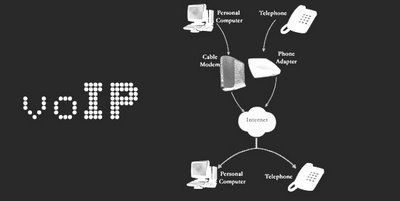CCS - voIP

voIP
‘voIP’ is the term used to describe the protocols which allow the routing of voice messages over the internet with Skype being the largest and most well known of the providers. Users of Skype and other popular voIP programmes like ‘Google Talk’ and ‘Amiciphone’ can not only call other voIP users for free but they can also call landline and mobile numbers, conduct teleconferences, leave voicemails, and make video calls from some of the newer versions of these programs. Users must buy credits ahead of making charged calls and these are generally cheaper then any service provided by traditional telecommunications companies. An example of an exception to this might be a voIP call, always charged by the minute compared to a specially discounted evening or weekend rate from a telecommunications company like BT which might charge a nominal fee for 60 minutes off peak. One of the few downsides for the user of voIP technology is that it is entirely dependant on the internet so that a poor internet connection will result in poor quality calls. Another benefit of voIP is that it allows you to make and receive calls from the same number no matter where you are in the world provided you have access to the internet. Anyone who has experienced the hassle and cost of calling from abroad and having your mobile switch to foreign networks with unknown pricing structures will appreciate what an improvement that would be. Also the software allows you to see who is online or available for contact so you’ll make less wasted calls and can simply leave a voice message for someone who is unavailable. In a stroke voIP corrects one of the most basic issues of normal landline use; not knowing if the person on the other end of the line is anywhere near their phone at all and in a lot of cases (where the other person doesn’t have an answer phone) having to call back later to make contact. It is little wonder that the rapidly increasing proliferation of voIP software worldwide represents a major challenge to traditional telecommunications companies shackled to the landline network, which is both more expensive to maintain and expend then a peer to peer network.
Issues and Challenges
The 1994 law, called the Communications Assistance for Law Enforcement Act (CALEA) compelled the telecommunications companies of the day to rewire their networks so that the American Police Department and the FBI could freely tap calls. After extensive lobbying the FBI is close to forcing a similar acquiesce from the voIP providers though two major appeals have been launched. One on the grounds of the massive financial cost of reorganising the networks and another from those who fear this is a big step towards the widespread regulation of the internet.
Another move worrying the users and purveyors of voIP software is the emergence of an “carrier-grade applications filters" which could be used to prevent the use of P2P networks including Skype like applications (http://www.theinquirer.net/default.aspx?article=26255). This could be very appealing to the telecommunications industries who are often the providers of the broadband internet which enables the voIP network. Their argument is that P2P networks are bandwidth greedy (they estimate 30% of bandwidth usage is from P2P applications) while generating exactly zero revenue for the service providers who would certainly love to use this new filtering software although the power of Ebay backed Skype might be enough tokeep us voIPing.

0 Comments:
Post a Comment
<< Home